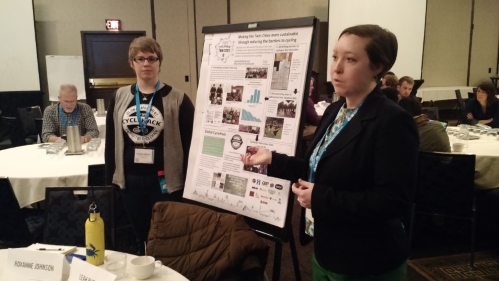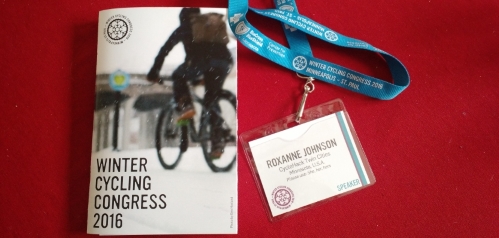CycleHack at the Winter Cycling Congress

This winter for the first time ever, the Winter Cycling Congress (WCC)- an international exchange of ideas and strategies to get people on bikes in the winter- was scheduled to be in the US; in my hometown of Minneapolis. I don’t do a lot of work on bike stuff but love riding my bike in all seasons so I was really curious about what such an event would be like. Since I had been involved in organizing a local CycleHack bike event last summer, I saw this opportunity to get myself into the conference.
I submitted a proposal to do a poster with my colleague and CycleHack co-organizer Leah Puffer. The organizers accepted the proposal and asked if we would also be willing to talk about CycleHack at a roundtable session. It seemed to me like a once in a lifetime opportunity so of course we said yes!
Our plan for the WCC was to tell folks about CycleHack Twin Cities and potentially recruit them to help organize an event for 2016. We also wanted to spread the word about CycleHack the global movement (since this was an international event), and tell people about the resources that the global organization and website offers to local groups interested in organizing their own CycleHack event.

Myself and Leah at one of our roundtables, photo by Sheldon Mains
We knocked our goals out of the park: Our poster session and round tables were well-attended, and people were really excited about the method of “CycleHacking” to get communities involved in thinking up ideas to address barriers to cycling. I made some contacts at local bike organizations that may be interested if we do another event, and we heard some feedback on project ideas generated at CycleHack that may be useful to actually create- particularly the spoke card that had rights and duties of a cyclist on one side and what to do in a crash on the other. People really liked that.
What was more interesting to me and what made the whole conference worth attending was that this year, the Congress looked at winter cycling through the lens of equity. Many of the sessions discussed groups that have been traditionally left out of cycling and cycling conversations both in Minneapolis and elsewhere, and what that means. It was also great to hear from people in those groups and not just about them from “the usual suspects”.
There were some great conversations about the way we talk about bikes and cycling as well as winter weather, types of bikers/cyclists/people who ride bikes, and how identity can impact who becomes a person who rides a bike. This conference set a bunch of my neurons in motion, influencing how I think broadly about my recreational work organizing as well as my career as a researcher and data storyteller. I had many thoughts and discussions on language, inclusion, equity, and engagement. Here are some of those thoughts, combined with some of the take-aways from my time at those sessions.
Language
Language is really important! There were several instances of intentional language that I found thoughtful and extremely useful. Some are about how we talk about individuals and communities, some are about the weather, all are people-focused and aim to re-frame the way we approach and understand problems, opportunities, and solutions.
Low wealth communities instead of low income communities. Income only refers to employment; we are talking about communities that are experiencing chronic long-term underinvestment and generational disparity.
Using “enslaved” instead of “slavery”. This was something I noticed in one of the sessions; I had heard an explanation elsewhere about bringing awareness to the people who caused and participated in slavery instead of making it sound like it was a thing that happened passively. Also, it centers enslaved people as people and not just their position in society (“slave”).
Media language- I went to a session where Glenn Kubish talked about how the news vilifies winter. I don’t watch a lot of news but I recognized each and every strategy he talked about seeing on his local news in Edmonton, Alberta. Here’s the list: Autocorrect: the bias toward the automobile; winter is hard because it’s difficult to drive in it. LoCalifornia: snow and cold is unnatural here! What do we do?! Silver Linings Playbook: “we all know the weather is bad, but there is a fun/bright side.” Snowmanthropomorphism (my personal favorite): winter is a bad guy! He’s out to get us! Also, let’s name winter storms with human names. Then we can yell AT them! Weathertorializing: winter is evil.
Later in that session, Dan Patterson from Hennepin County put up a list of words he’d like to eradicate from bike vernacular: Alternative transportation: It’s just transportation. Amenity: he put up a picture of a chocolate fountain. We’re not talking about nice-to-haves. Accident: crashes are avoidable and something caused it, it’s not an “accident”. Drivers: reframe to people driving (people-first language) Bicyclist: people biking Pedestrian: people walking The car did it: blaming the car erases the person who caused a problem. “Hit and killed” is passive and doesn’t emphasize that a person driving a car killed someone. Vehicles: bikes are vehicles! If you’re talking about motor vehicles, say so. Citizen: cities don’t have “citizens”, they have residents. This also leaves out people in a community who are not citizens. Delay: a delay is unexpected and you can’t anticipate it, like bad weather grounding planes at an airport. Time spent at an intersection should be called waiting your turn.
Intention
I attended a workshop on how to create a skillshare presented by Low and Julia from Grease Rag Ride and Wrench, a women-trans-femme (WTF) bike organization. The facilitators were very intentional about creating a safer space: using everyone’s preferred gender pronouns, encouraging everyone to participate, setting some ground rules, and clearly identifying what it looked like to participate and what the expectations were. The intentional facilitation made the space overtly welcoming, instead of simply saying “all are welcome”. This is something I’m trying to learn more about because we say this for most events I’m involved in, but what does it mean? How do you show participants that this is a space for them, and actually make it a space that’s welcoming to them? These facilitators were able to do that.
Identity
One session I attended got us talking about our identities and privileges. I found this one interesting because I’ve been moving away from an identity-focused mindset. It started to bother me that I feel that sometimes I have to “identify” as something- a programmer, a cyclist, a feminist, a scientist. Sometimes I don’t feel like I AM those things, even though I DO those things. I’ve started thinking more in terms of action and the things I do instead of what I am. That said, I think it is useful to be aware of your identity especially as others may perceive it because there are privileges associated with certain aspects of identity. For example, I am a white, middle-class, US-born, educated woman. These facts definitely influence how I move through the world and the experiences I have. I’ still thinking about this one.
Culture
There was a theme of talking about the different types of cyclists we have here in Minneapolis and also elsewhere. I talked to a woman from the Netherlands who was very confused about North American bikers when she started working with them- recreational cyclists and their spandex were completely foreign to her. And so are their bikes. Dutch bikes all come with lights, fenders, and ways to carry things, because in the Netherlands everyone rides to run errands- including taking their kids to school. In the US, we may not have access to bikes like that.
During the panel I mentioned on language, Bill Lindeke was talking about his research on what gets new people on bikes. He brought up that one challenge is that how you interact with the city around you on a bike is completely different than in a car- you have to learn and become comfortable with that new (and more vulnerable) way. This comfort will also depend on what kind of bike you ride. When roads are designed for cars, the make/model of the car doesn’t matter. When infrastructure is designed for bikes, it matters.
This is also where the hashtag #cartesia was coined. It means “the disembodiment that is car driving”. I love it.
There was another culture conversation going on about ways to engage groups underrepresented in bike advocacy work. This conversation was about “meeting people where they’re at” and doing the work to understand a community, how it operates, and how people in that community prefer to get involved before simply engaging them in a standard or historic way. There was also a clear message about the need to compensate people for their expertise and respecting the value of their experiences. Lastly, there was a call to action to tell it like it is and name problems instead of tiptoeing around them with coded language. This includes acknowledging racism and racial disparities exist, that they and the systems that hold them up are intentional, and that to change them we also need to be intentional and take action for racial justice.

